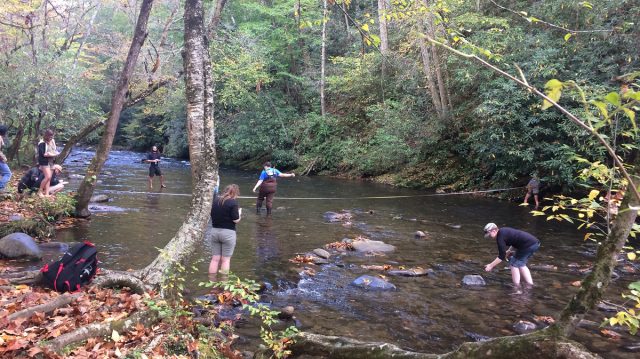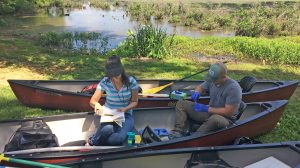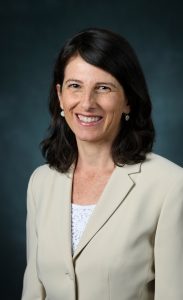
Middle Tennessee State University students in a geosciences hydrogeology course conduct stream morphometric analysis in a Great Smoky Mountains National Park stream. Assistant professor Racha El Kadiri received a grant from the U.S. Department of Agriculture to partner with the University of Mississippi to study the role and potential effects of climate change on conservation practices and 21st century agricultural challenges. Photo courtesy Racha El Kadiri/MTSU
OXFORD, Miss. – University of Mississippi and Middle Tennessee State University faculty and student researchers are collaborating on a U.S. Department of Agriculture National Institute of Food and Agriculture grant project involving climate change, conservation practices and helping train the next generation of environmental scientists and engineers.
The three-year, $271,555 USDA grant is a research effort for UM engineering students and the MTSU Department of Geosciences environmental science students to study the role and potential effects of climate change on conservation practices and 21st century agricultural challenges.
Cristiane Surbeck, UM associate professor of civil engineering, and Henrique Momm, MTSU interim geosciences chair, are the project co-directors. Surbeck specializes in environmental and water resources engineering and is involved in other USDA grant projects. Momm has experience with integrating remote sensing technology, computational sciences and watershed modeling for improved understanding of watershed systems and the associated processes.
“At the University of Mississippi, we will be aiming to use data and computer models to predict how the management of agricultural lands can affect pollution,” Surbeck said. “We will also study receiving water bodies and partnering with the USDA National Sedimentation Lab in Oxford, so there will be a very real-life application to our research.”
An Ole Miss graduate student will help analyze the model results and plan a new course for junior- and senior-level students. The course, titled “Sustainable Natural Resources Management for Agriculture,” will include tours of agricultural watersheds, work with a computer model and lead students to understand how watersheds should be managed to protect receiving water bodies.
Racha El Kadiri, MTSU geosciences professor, is the project director. She is an environmental scientist who applies machine learning, remote sensing, geographical information systems and computational methods to address a wide range of hydrological and environmental problems.
While many studies focus on the effects of climate change on crop yield in regard to the observed and projected temperature changes in the 21st century, El Kadiri said there “have not been enough studies on how effective the conservation practices we are implementing today will be in the future.”
“We are attempting to fill this knowledge gap by using machine learning and watershed modeling to study the linkages between a changing climate and the effectiveness of conservation practices,” she added. “The results would be a step toward an adaptation to climate change, improving food security in the 21st century and preserving national water and soil resources.”

Middle Tennessee State University assistant professor Racha El Kadiri (left) and student Kevin O’Toole conduct field water quality analysis on Todds Lake in Rutherford County, Tennessee. Submitted photo
The study will be completed on various pilot watersheds from around the nation, including in the Southeast, Midwest and West Coast.
“The ultimate goal of this research is the optimization of the conservation practices in space – different U.S environments – and in time, in response to a changing climate,” El Kadiri said.
The education component will involve the creation of curriculum for MTSU environmental scientists and Ole Miss engineers “to better understand the environmental challenges and uncertainties of agriculture in the 21st century,” El Kadiri said.
“Environmental science students and engineers are traditionally not trained in agronomy, and agronomists are traditionally not environmental scientists and engineers,” she said. “This will act to bridge the gap between these two fields at our institutions, accomplishing this through research, curriculum development and experiential learning experiences.”
“This is a tremendous research opportunity for our geosciences students and faculty and the makings of an excellent partnership between two outstanding universities,” said Dave Puleo, dean of the UM School of Engineering. “We all look forward to the results.”
